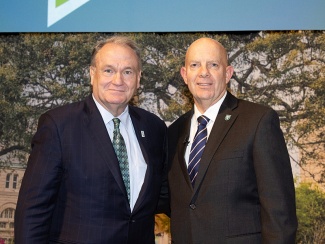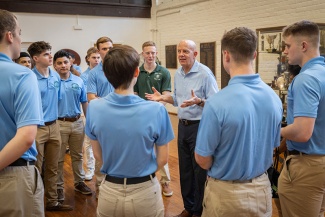In conversation with Tulane President Michael A. Fitts, Berger recalled a college experience that also included Mardi Gras, the New Orleans Jazz & Heritage Festival, competitive club lacrosse and a part-time job with a Cajun carpentry company.
Berger believes his life would have turned out much differently had he not attended Tulane. “You’re thrown into a melting pot from day one,” he said. “If you can succeed in that environment, you can succeed anywhere.”
And succeed he did. In his introduction, Fitts described Berger as a “legendary leader,” rising to the highest ranks of the U.S. Marine Corps over four decades of service. During those 40-plus years, he led a battalion during “Operation Secure Tomorrow” in Haiti and a regimental combat team during “Operation Iraqi Freedom” in Iraq.
As a general officer, he led multiple forces in Afghanistan during “Operation Enduring Freedom” and he held crucial staff and joint assignments as a policy planner, chief of staff, director of operation and deputy commandant for combat development. He later earned multiple advanced degrees, including a Master of International Public Policy from Johns Hopkins University.
“It’s no wonder that former Defense Secretary Lloyd Austin called him a ‘warrior-scholar,’” Fitts said.
In 2019, Berger was nominated and confirmed as the 38th Commandant of the Marine Corps, a role he used to launch a massive restructuring known as Force Design 2030. “It was the most dramatic transformation of the Marine Corps in decades,” Fitts said.
Berger introduced Force Design 2030, also known as FD2030, in 2020 as a way to transform the Marine Corps into a more agile, efficient and technologically advanced force to meet the combat challenges of the future.
































































